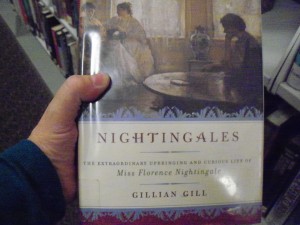Safely ensconced at the library.
Today in the Biography section.
I’m surrounded by books, to whose siren song I shall not succumb!
Well, I feel I must acknowledge their presence…
Okay:Â quote from random book pulled off random shelf:
” By the early 1840’s, power was already a key concept for Florence Nightingale. She saw that, for all their many excellencies, the women she knew had no desire for power. It did not occur to them to want it.  But she did want it and this made her different. In the eyes of the world, it made her aberrant.”
-Â Â Nightingales by Gillian Gill, pg 176
Okay, back to work.

September 17th, 2012 at 7:46 pm
You know, the Nightingale quote almost sounds like something that might have come from the Steerswoman. Not that Rowan wants power, I mean, but that sort of observation about women & power.
Does that make any sense or am I too tired tonight?
September 19th, 2012 at 6:46 am
David —
You’re making perfect sense.
Also there are several meanings to the word “power.” There’s power as in “power over people”, which of course Rowan does not want… But one of the other kinds of power is the ability to take action in the world, and have your actions have an effect. In the past (big generalization, here), women in western civilization were not only denied power (authority to command others) but also denied personal power — that is to say, agency. They were assumed to be ineffectual, and trained to be so. And then had their resulting ineffectualness indicated as proof that they were incapable of either authority or autonomy.
But in Rowan’s world, she doesn’t have to “want” autonomy, agency, or effectiveness — because it’s never assumed that she can’t have that.
And that’s one of the fun things about writing in that world.
But the Nightingale quote, being so short — I can’t tell which “power” the author means! Both, possibly.
September 17th, 2012 at 8:18 pm
The chapter on Florence Nightingale in Strachey’s Eminent Victorians is a good short intro. At one point the military tried to get rid of her by sending her party off on a trip with no food. But she brought her own.
The rest of Eminent Victorians is good, too. The portait of Cardinal Manning is the funniest religious history I have ever read.
OK, I’ll stop interrupting, because I love the Steerswoman books and I don’t want to contribute to any delays.
September 19th, 2012 at 6:47 am
Walter —
Funny religious history… oh, so tempting!
September 19th, 2012 at 6:41 pm
Strachey’s portrait of Florence Nightingale is mostly about her power struggle with the military, not about the angel in white visiting the wounded.
“It was not by gentle sweetness and womanly self-abnegation that she had brought order out of chaos in the Scutari hospitals, that, from her own resources, she had clothed the British Army, that she had spread her dominion over the serried and reluctant powers of the official world; it was by strict method, by stern discipline, by rigid attention to detail, by ceaseless labour, and by the fixed determination of an indomitable will.”
From the first paragraph of the profile:
“A Demon possessed her. Now demons, whatever else they may be, are full of interest. And so it happens that in the real Miss Nightingale there was more that was interesting than in the legendary one; there was also less that was agreeable.”
http://en.wikisource.org/wiki/Eminent_Victorians/Florence_Nightingale
September 20th, 2012 at 3:22 pm
Walter —
It’s the womanly self-abnegation that they tried to sell us on, when I was a kid.
“Can’t find any women in history to look up to? But wait — there’s Florence Nigtingale!”
Because she took care of people. An acceptable thing for women to do.
That was the legend they pushed on us: She worked hard, and sacrificed, in order to help.